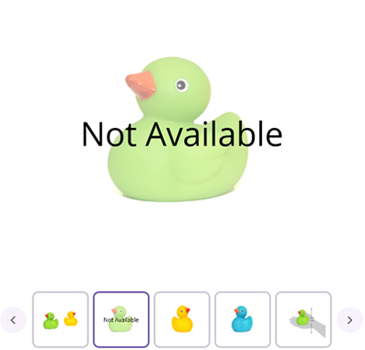Having trouble getting help?
Contact Support
Contact Support
DataTemplateSelector in .NET MAUI Rotator (SfRotator)
The SfRotator supports DataTemplateSelector, from which you can choose a DataTemplate based on the data object.
<ContentPage.Resources>
<ResourceDictionary>
<DataTemplate x:Key="DefaultTemplate">
<Grid>
<Image Source="{Binding Image}" HorizontalOptions="Center" VerticalOptions="Center"/>
</Grid>
</DataTemplate>
<DataTemplate x:Key="SpecificTemplate">
<Grid>
<Label Text="Not Available" FontSize="50" HorizontalOptions="Center" VerticalOptions="Center"/>
<Image Source="{Binding Image}" Opacity="0.5" >
</Grid>
</DataTemplate>
</ResourceDictionary>
</ContentPage.Resources>
<ContentPage.Content>
<Grid >
<syncfusion:SfRotator x:Name="sfRotator"
ItemsSource="{Binding ImageCollection}" >
<syncfusion:SfRotator.ItemTemplate>
<local:DataTemplateViewModel DefaultTemplate="{StaticResource DefaultTemplate}" SpecificTemplate="{StaticResource SpecificTemplate}"/>
</syncfusion:SfRotator.ItemTemplate>
</syncfusion:SfRotator>
</Grid>
</ContentPage.Content>
</ContentPage>public partial class MainPage : ContentPage
{
DataTemplate defaultTemplate;
DataTemplate specifictempalte;
public MainPage()
{
InitializeComponent();
this.BindingContext = new ViewModel();
SfRotator rotator = new SfRotator();
defaultTemplate = new DataTemplate(() =>
{
Grid grid = new Grid();
Image image = new Image();
image.SetBinding(Image.SourceProperty, "Image");
grid.Children.Add(image);
return grid;
});
specifictempalte = new DataTemplate(() =>
{
Grid grid = new Grid();
Image image = new Image();
Label label = new Label();
image.SetBinding(Image.SourceProperty, "Image");
image.Opacity = 0.5;
label.Text = "Not Available";
label.FontSize = 50;
label.HorizontalOptions = LayoutOptions.Center;
label.VerticalOptions = LayoutOptions.Center;
grid.Children.Add(image);
grid.Children.Add(label);
return grid;
});
var ImageCollection = new List<Model> {
new Model ("image1.png"),
new Model ("image2.png"),
new Model ("image3.png"),
new Model ("image4.png"),
new Model ("image5.png")
};
rotator.NavigationDirection = NavigationDirection.Horizontal;
rotator.NavigationStripMode = NavigationStripMode.Thumbnail;
rotator.BackgroundColor = Colors.White;
rotator.ItemsSource = ImageCollection;
rotator.ItemTemplate = new DataTemplateViewModel { DefaultTemplate = defaultTemplate, SpecificTemplate = specifictempalte};
this.Content = rotator;
}
}OnSelectTemplate
The OnSelectTemplate is an overridden method to return a particular DataTemplate, which is shown in the following code:
public class DataTemplateViewModel : DataTemplateSelector
{
public DataTemplate DefaultTemplate { get; set; }
public DataTemplate SpecificTemplate { get; set; }
protected override DataTemplate OnSelectTemplate(object item, BindableObject container)
{
var rotatorModel = item as RotatorModel;
if (rotatorModel == null)
return DefaultTemplate;
// Apply the SpecificTemplate for a specific condition, e.g., check the image name or any other property
if (rotatorModel.Image == "image2.png")
{
return SpecificTemplate;
}
return DefaultTemplate;
}
}The following screenshot illustrates the output of above code.

Find the complete DataTemplateSelector sample from this link.